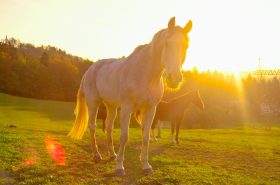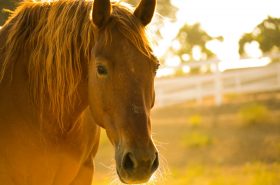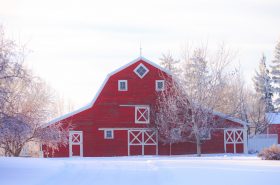As I have become more environmentally aware over the years, I have also sought to manage my horses in a greener way.
It’s not that horses, alone, are bad for the environment; it’s how we
manage them that can cause problems. For example, overstocking pastures leads to
overgrazing which then degrades the soil and invites invasive weed species to thrive. Not to
mention, more manure in concentrated areas creates more phosphorus runoff into nearby
waterways. This is detrimental to both aquatic plant and animal life (not to mention, bad for
drinking water).
With that said, I thought I’d share a few easy ways to go “green” on the horse farm.
Manure Management
Manure is always going to be an issue when keeping horses. The best thing you can do is
compost it and then use it in your gardens, on your lawn, or give it away to neighbors for the
same use.
No matter what, manure piles should be kept away from wells or other water sources so that
runoff won’t cause a problem. Covering piles with tarps or keeping it in bins is the best way to
keep pollutants from leaching into the ground and nearby waterways.
Pasture Rotation
Even if you aren’t overstocking your pastures, it’s easy for them to become overgrazed over
time. This is where pasture rotation can be very helpful. Even if you only have one pasture, you
can divide it into sections or strips with temporary fencing and move your horses to a new area
as one becomes grazed down. Allowing pastures to rest, will help ensure that they stay
healthier, which will benefit the land and your horses in the long run.
Green Pest Control
By avoiding chemicals such as permethrin, which can be highly toxic to aquatic life, and using
natural methods of pest control instead, we can make a difference to the environment. The
following are all methods of natural pest control that you can employ on the farm instead:
• Encourage birds such as barn swallows, flycatchers, and purple martins by providing bird
houses or places for them to build their nests. All of these birds love to feast on insects.
• Use fly predators on and around manure piles.
• Build a bat house or two. Bats are also voracious insect eaters.
• Remove areas of standing water where mosquitoes lay their eggs. Also, change water in
tanks at least once weekly.
• Use fly sprays with natural ingredients instead of harmful chemicals.
Renewable Energy Forms
Finally, find ways to switch to renewable energy sources. For example, you can use a solar
charger for your electric fence. You can also line walkways with solar lights or even consider
installing solar panels on the barn to generate electricity. If you have a well, a functional windmill
can be installed to pump water, saving you money in the long run.
Going green on the farm doesn’t have to be difficult. Find small ways to implement more
environmentally-friendly changes that will collectively make a big difference!



